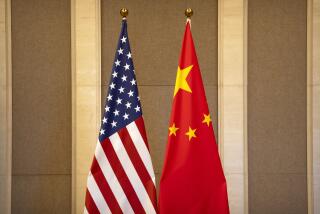U.S. Executives Too Parochial, Survey Finds
- Share via
U.S. corporations will continue to lose ground to foreign competitors in world markets because of shortcomings in the nation’s executive ranks and the rest of its work force, according to a major new study.
The report--based on a survey of about 1,500 top managers worldwide by executive recruiters Korn/Ferry International and the Columbia University business school--faulted Americans for minimizing the value of learning foreign languages and cultures. Executives in Japan, Western Europe and Latin America, on the other hand, were found to place a high priority on multilingualism.
“These results,” said the report, “provide a poignant indication of national differences that promise to influence profoundly the success of American corporations. The insularity of U.S. attitudes toward international business and international communications . . . points to a continuation of America’s lagging competitiveness.
“By discounting the importance of an international outlook, of multilingualism and of foreign assignments,” the report continued, “our U.S. respondents gave expression to a parochialism that can only inhibit opportunity.”
The study, which projected economic conditions in the year 2000, said that a shortage of U.S. senior managers prepared to run global businesses will translate into “the highest level of executive turnover in history.”
“The shortage of talented executives with the abilities and background necessary to run global businesses will soon become a major theme of human resource management, and human resource management will become the most significant challenge facing business,” the study said.
According to the study, only 2% of U.S. executives believe that knowledge of foreign languages will be a very important business factor in 2000. Among Japanese executives, the figure was 13%--despite the fact that their foreign language skills, in general, already surpass those of their American counterparts, the authors of the study said.
However, Warren Bennis, a USC business professor who has written books on executive leadership, said the study’s assessment on that score does not square with what he has found at most of the nation’s largest companies.
“I see tremendous change in the mind-set of executives at top companies about the importance of international understanding and language skills,” Bennis said, “and that awareness is increasing all the time.”
‘Coming Up Short’
Americans responding to the survey, who accounted for 44% of those polled, expressed more concern about the quality of the U.S. work force than in top executives’ foreign language skills. Asked to predict their competitive advantages in the year 2000, only 4.8% of the Americans cited “availability of qualified personnel.” In contrast, 9.3% of the Japanese respondents saw their country’s labor pool as an important future asset.
“American education, training and development are seen as coming up short in the business world,” the report said.
In another section of the report, the respondents--representing corporations that produce about 10% of the world’s goods and services--said they believe that the United States’ economic and political power will decline substantially during the next decade. For example, 69.5% said the United States was the most economically powerful nation in 1988, but only 45.2% believe that it still will be in 2000.
Even so, the United States came out narrowly ahead of Japan as the nation most likely to be the world’s economic leader in 2000. The study found that 39.8% of the executives believe that Japan will hold that position at the beginning of the next century.
“This means that we are in for several decades of shared leadership in the business world,” said Lester Korn, chairman of Los Angeles-based Korn/Ferry. “That would mean more joint ventures by multinational corporations.”
Japan will be gaining economic ground in world markets over the next 11 years, according to the respondents. However, Japanese executives believe that they are likely to lose some of their domestic market to foreign firms, according to the study. Of all the nationalities represented in the survey, Japanese executives expressed the most concern about the prospect of competition on the home front.
More to Read
Inside the business of entertainment
The Wide Shot brings you news, analysis and insights on everything from streaming wars to production — and what it all means for the future.
You may occasionally receive promotional content from the Los Angeles Times.










